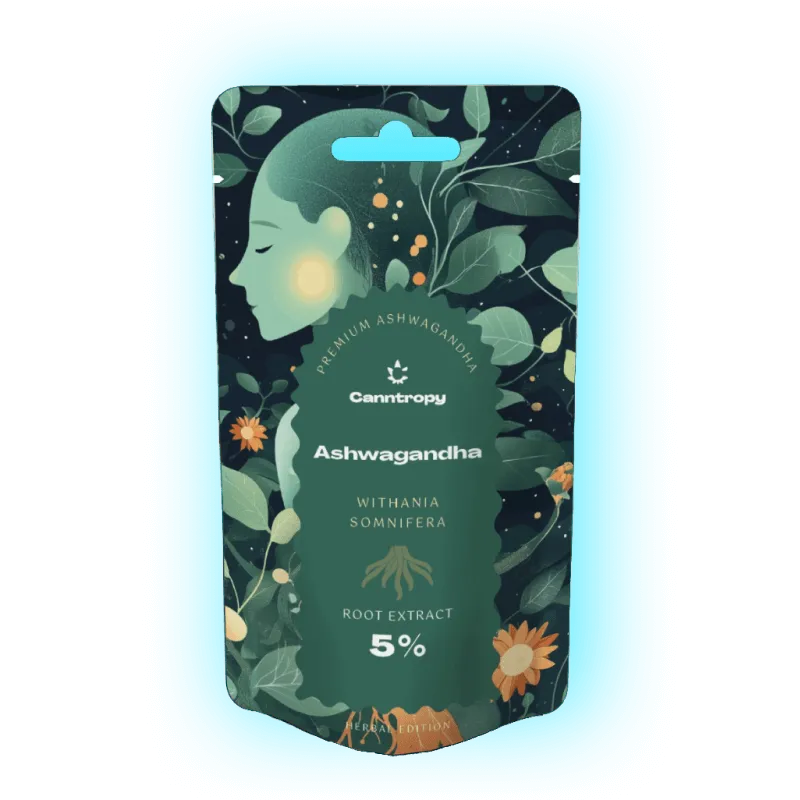What is Ashwagandha?
Ashwagandha, scientifically called Withania somnifera , is a plant that's been used in traditional Ayurvedic medicine for over 3,000 years. It's often called "Indian ginseng" or "winter cherry," and is one of the so-called adaptogens—plant compounds that are supposed to help your body handle stress better. The main active ingredients in Ashwagandha are the withanolides, a group of natural compounds mostly found in the plant's root, known for their calming and anti-inflammatory effects. Ashwagandha originally comes from the dry regions of India and North Africa, but nowadays it's available worldwide as a supplement in capsules, powders, and teas. People use this plant for all sorts of reasons, like boosting mental and physical well-being, supporting the immune system, and improving sleep quality. Especially in today's health and Wellness scene, Ashwagandha has become popular as a natural way to reduce stress and boost energy.
Ashwagandha effects
Ashwagandha, also known as "Indian ginseng," is a traditional healing plant from Ayurvedic medicine. Its calming effects has been used for centuries to strengthen body and mind and ease stress. The active compounds in the root, especially the so-called withanolides, act on the central nervous system and can lower cortisol levels in the body, which helps reduce stress. Ashwagandha also boosts the immune system and supports overall well-being, which can be especially helpful in hectic times. More and more scientific studies are backing up these traditional findings, confirming the positive effects of Ashwagandha on stress, anxiety, and sleep quality. If you're dealing with stress or want to sleep better, Ashwagandha could be a natural way to get some support.
Ashwagandha Side Effects
Even though Ashwagandha is generally considered well-tolerated, some people might experience mild side effects. These are usually digestive issues like nausea, diarrhea, or a bit of an upset stomach. In some cases, Ashwagandha can also make you feel a little sleepy, especially if you take higher doses. That's why you should always pay attention to the dosage and start slow to see how your body reacts. Pregnant and breastfeeding women are usually advised not to take it, since the active ingredients could also affect the baby. If you're unsure or taking other meds, it's a good idea to check with a doctor first.
Ashwagandha Dosage: What's the Ideal Amount?
The ideal dosage of Ashwagandha really depends on your personal goals and health. In general, it's recommended to take between 300 and 500 mg per day if you're looking for overall relaxation and stress relief. For specific issues, like trouble sleeping or athletic performance, the dosage might be different. If you're new to Ashwagandha, it's best to start with a low dose and slowly increase it if you tolerate it well. Taking too much can make you feel sleepy or a bit dizzy. So it's a good idea to adjust your intake gradually and, if needed, check with a doctor or alternative health practitioner to figure out the best and safest amount for you.
Ashwagandha Powder or Capsules: Which Form Is Better?
Whether you take Ashwagandha as a powder or in capsules mostly comes down to personal preference. Capsules make it easy to get the right dose and are super convenient—perfect for on the go or if you want to avoid the bitter taste of the powder. The powder, on the other hand, is more versatile and can be mixed into smoothies, yogurt, or tea, making it easy to fit into your daily routine. Plus, your body absorbs the powder a bit faster, which can mean quicker effects. Both forms have their pros and cons, so it really depends on what you need and how you want to use it.



